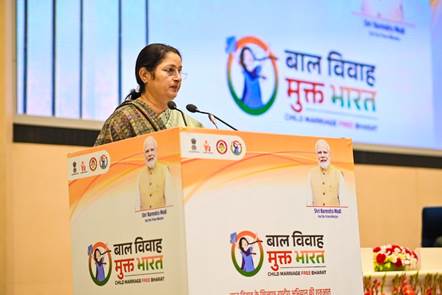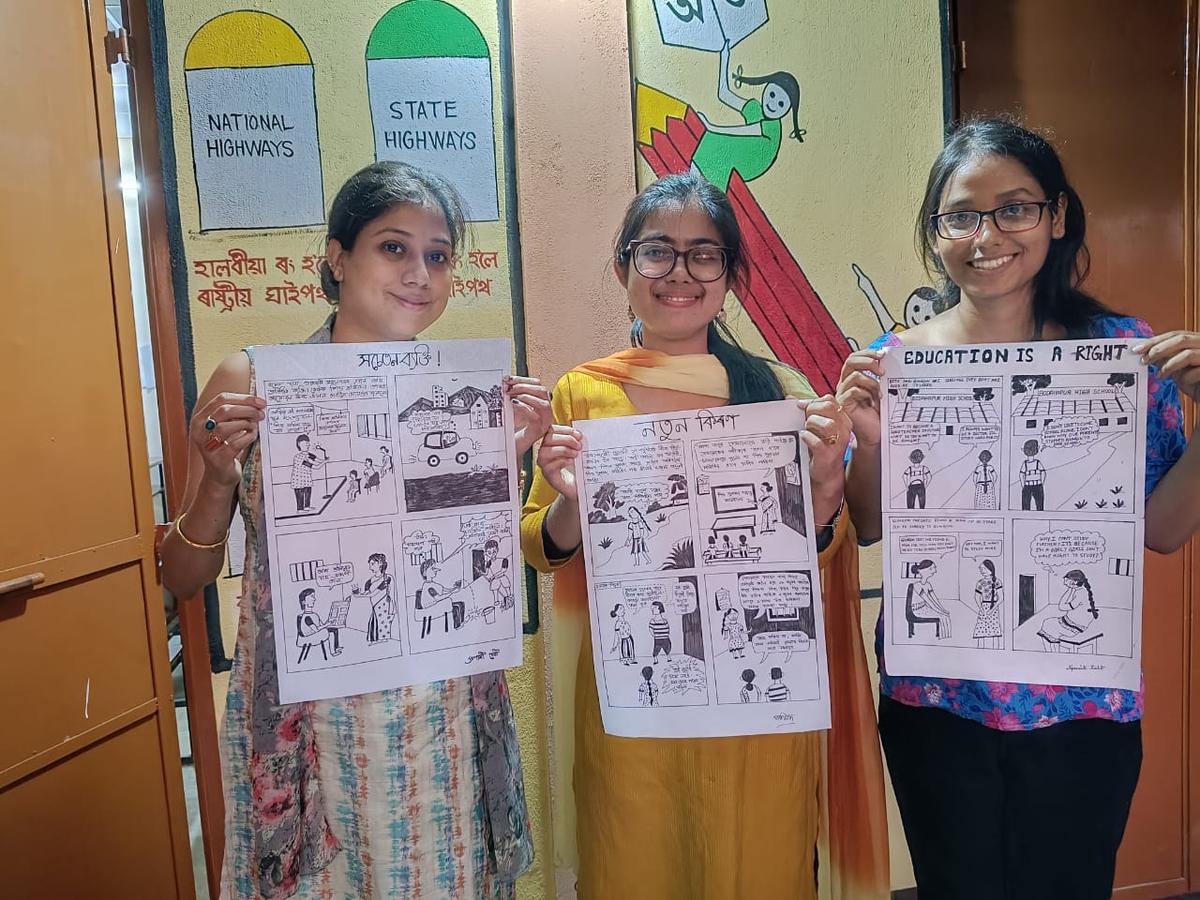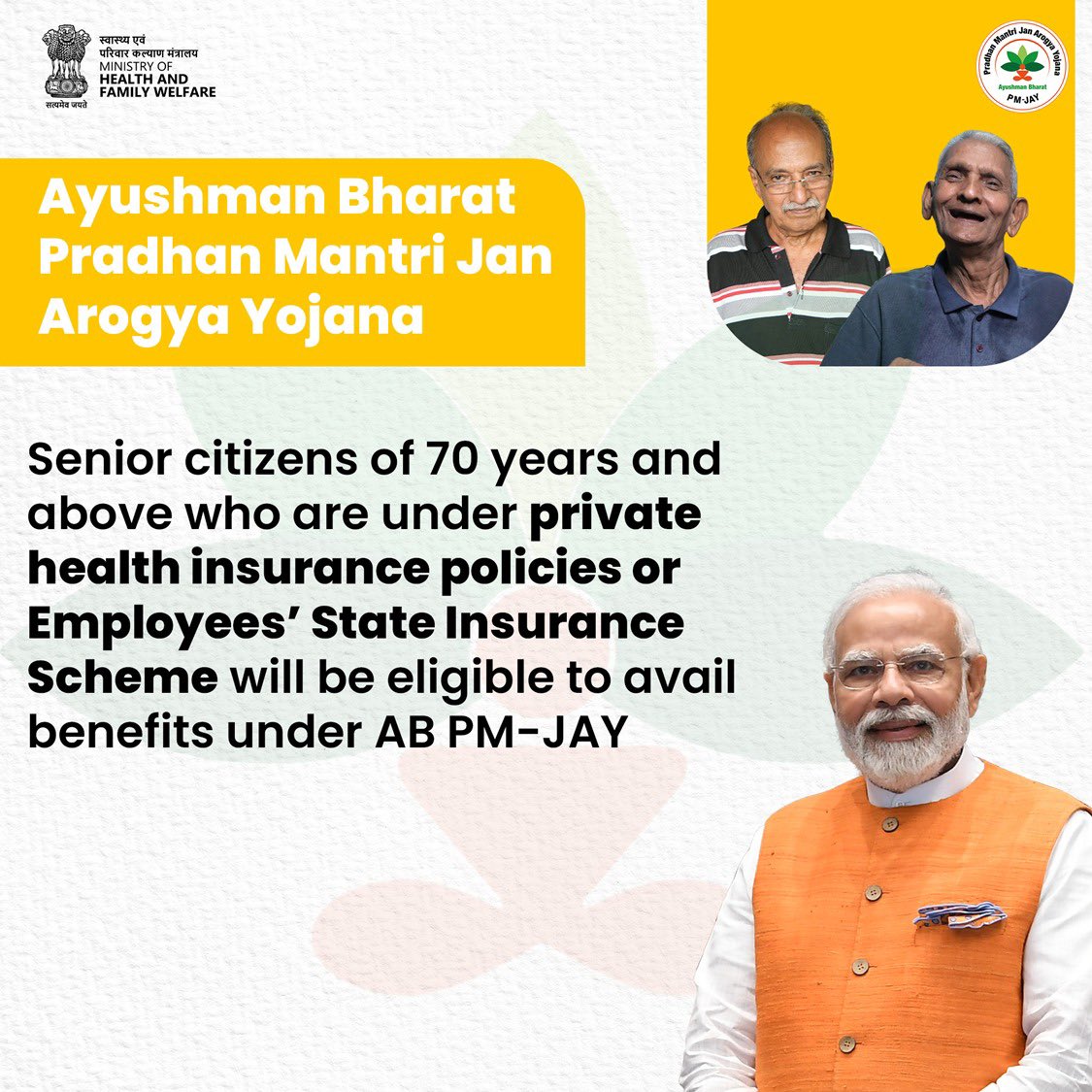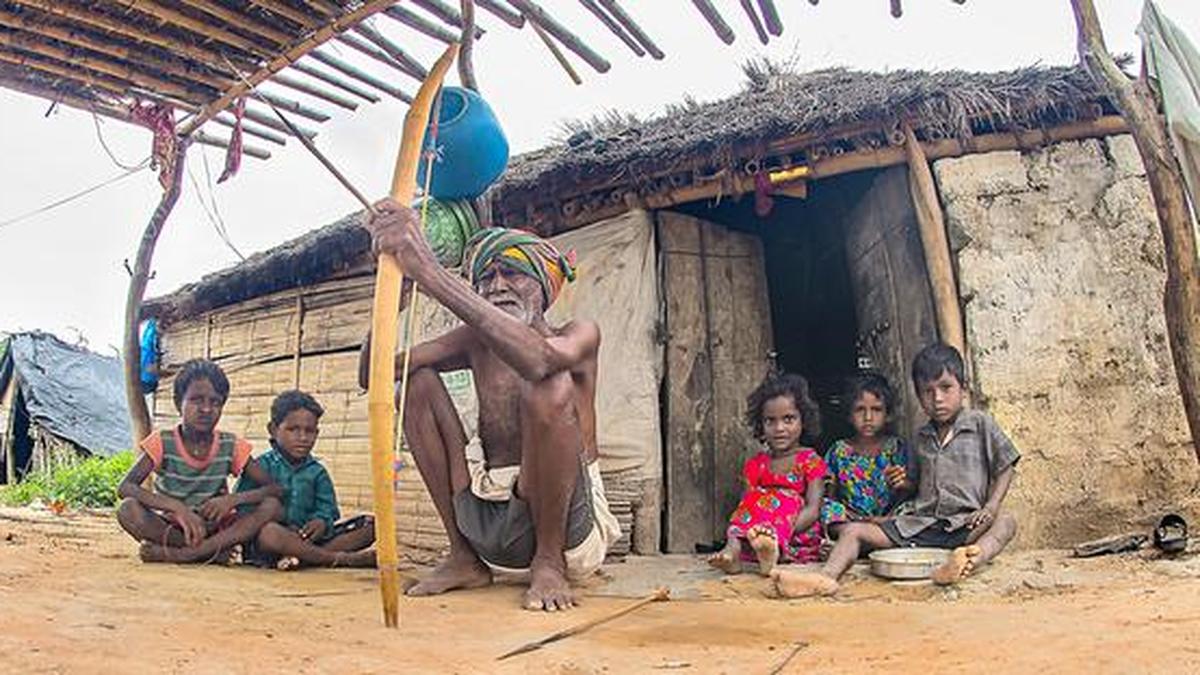'Bal VivahMukt Bharat' Campaign

- 29 Nov 2024
In News:
- The Union Minister for Women and Child Development launched the “Bal VivahMukt Bharat” campaign aimed at eradicating child marriage in India.
- Goal: Reduce child marriage rates to below 5% by 2029.
- Focus: Engage multiple stakeholders, raise awareness, and leverage technology for eradication.
Target Areas:
- Target States: West Bengal, Bihar, Jharkhand, Rajasthan, Tripura, Assam, Andhra Pradesh.
- High-Burden Districts: Nearly 300 districts with higher rates of child marriage.
Child Marriage Free Bharat Portal:
- A digital platform to raise awareness, report cases, and track progress on child marriage prevention.
- Real-time tracking by Child Marriage Prohibition Officers (CMPOs).
Monitoring and Accountability:
- Central nodal officers and CMPOs will oversee the campaign’s implementation at state and district levels.
- The portal facilitates citizens’ participation by allowing complaints and providing information on legal remedies.
Progress and Impact:
- Child marriage rates have reduced from 47.4% (2005-06) to 23.3% (2019-21).
- The goal is to reduce these rates further to below 5% by 2029.
Awareness and Community Engagement:
- Public campaigns and community mobilization to challenge societal norms and change attitudes towards child marriage.
- The campaign will continue through various channels, including the BetiBachaoBetiPadhao initiative.
Legal Framework:
- Strengthening the Prohibition of Child Marriage Act (PCMA), 2006, which sets the legal marriage age at 18 for women and 21 for men.
- Penalties for those involved in child marriage include imprisonment and fines.
Key Challenges for Child Marriage:
- Poverty: Families may view early marriage as a financial relief.
- Cultural Norms: Deep-rooted societal beliefs about preserving family honor.
- Gender Inequality: Patriarchal systems view girls as burdens.
- Lack of Education: Limited access to schooling forces early marriages.
- Fear of Sexual Assault: Misguided belief that early marriage protects girls.
- Weak Law Enforcement: Corruption and inadequate resources hinder the law’s implementation.
- Pandemic Impact: Economic hardships during COVID-19 led to an increase in child marriages.
Related Initiatives:
- Prohibition of Child Marriage Act (PCMA), 2006: Strengthens child marriage laws and establishes CMPOs.
- Success Stories: Individuals like BuchaRamanamma, Durga, and Roshni Perween have inspired others by stopping their own child marriages and advocating for change.
Campaign and National Vision:
- The campaign aligns with the Prime Minister’s vision for a Viksit Bharat (Developed India) by 2047.
- It aims to empower women and girls, providing them with opportunities for education, health, and safety.
- Collective effort from the government, social organizations, and citizens is crucial to eliminating child marriage.
Comics Commandos in Assam

- 11 Nov 2024
In News:
- "Comics Commandos" is an innovative initiative launched in Goalpara district, Assam, aimed at combating child labour and child marriage through the creative medium of comics.
- The initiative trains 30 local youths to create comic strips that use humour and minimal text for effective communication and public engagement.
Purpose and Objectives:
- Primary Goal: To raise awareness about child labour and child marriage, two major social issues prevalent in the region, by using visual storytelling.
- The initiative aims to resonate with the local community, focusing on everyday struggles like economic hardship, child abuse, and the social norms that perpetuate these issues.
- Rising Dropout Rates: Assam has witnessed an increase in school dropout rates, from 3.3% in 2020-21 to 6.02% in 2021-22, exacerbated by economic pressures like poverty, which force children to work or marry early.
Execution and Approach:
- Training: Thirty local youths are trained to design caricatures and doodles for the comics, ensuring the messages are both simple and engaging for a broader audience.
- Visual Storytelling: The use of visuals over text helps overcome literacy barriers and makes the message more impactful and accessible.
- Community Involvement: The program collaborates with teachers and school committees to facilitate wider participation and support in creating social awareness.
Government Support:
- Chief Minister HimantaBiswaSarma initiated a state-wide campaign in 2023 against child marriage, with the ambitious goal of eradicating it by 2026. This initiative aligns with the state's broader efforts to address social issues.
Impact of the Initiative:
- Comics Commandos is being seen as an effective tool for community empowerment and awareness generation in a region that faces persistent social challenges.
- By involving local youths in the campaign, the initiative ensures community participation and ensures that the message is communicated in a culturally relevant manner.
- The program also empowers young people to use their creativity for social change, thus helping build leadership and social responsibility among the youth.
PM rolls out Ayushman Bharat for Citizens aged 70 and above

- 01 Nov 2024
In News:
Prime Minister Narendra Modi has expanded the Ayushman Bharat Pradhan Mantri Jan Arogya Yojana (PM-JAY) to provide health coverage to citizens aged 70 years and above, regardless of their income or economic status. This move is aimed at addressing the healthcare challenges faced by India's elderly population, which has been growing rapidly.
Key Highlights of the Ayushman Bharat Expansion:
- Health Coverage for Elderly:
- Ayushman Vaya Vandana Card: This new health card offers Rs 5 lakh annually for individuals aged 70 and above. The coverage is shared within the family, so if there are multiple elderly beneficiaries in one household, the total cover will be split.
- Scope: This initiative is designed to provide a safety net for elderly people, many of whom had previously been unable to access treatment due to high costs.
- Significance of the Scheme:
- India’s elderly population is rapidly growing, with the number of people over 60 expected to reach 319 million by 2050, up from 103 million in 2011.
- The expansion of PM-JAY to include those aged 70+ is a critical step in making universal health coverage more inclusive as India’s population ages.
- Eligibility and Registration:
- Individuals aged 70 years and above must register on the PM-JAY portal or through the Ayushman app. Those who already have an Ayushman Bharat card must complete an eKYC process to receive the new card and coverage.
- Exclusions: The scheme is not available in Delhi and West Bengal, as these states have not adopted the Ayushman Bharat scheme.
- Financial Details:
- The initial outlay for this expansion will be Rs 3,437 crore, covering the remainder of the current financial year and the next year.
- Cover for Overlapping Health Schemes: Elderly individuals who are already covered under other government schemes (e.g., CGHS, Ex-Servicemen Contributory Health Scheme) will have the option to either continue with their current coverage or choose Ayushman Bharat. Those with ESIC or private insurance can access both Ayushman Bharat and their existing cover.
- Coverage Scope:
- The expansion is expected to benefit approximately 6 crore individuals across 4.5 crore families.
- Existing Coverage: Around 1.78 crore elderly people are already covered under the scheme. Additional coverage will be provided to those not currently included in the scheme.
- Interoperability with Other Schemes:
- Those under the Central Government Health Scheme (CGHS), Ex-Servicemen Contributory Health Scheme (ECHS), or other similar schemes will need to choose between their current insurance and the Ayushman Bharat scheme.
- However, individuals enrolled in Employees' State Insurance Corporation (ESIC) can have both their existing cover and the Ayushman Bharat coverage.
- Rollout and Reach:
- The scheme will be implemented across 33 states and Union Territories, except Delhi, Odisha, and West Bengal.
- Over 29,600 hospitals, including more than 12,600 private facilities, are empanelled to provide treatment under PM-JAY.
Other Key Announcements:
- U-WIN Portal: A pan-India digital platform for routine vaccinations, aimed at enhancing the efficiency of vaccination programs.
- Critical Care Facilities: The Prime Minister also launched critical care infrastructure, including new facilities in AIIMS Bhubaneswar, Kalyani, and super-specialty units in Himachal Pradesh and Madhya Pradesh.
'Act4Dyslexia' Campaign

- 29 Oct 2024
In News:
- On October 27, 2024, prominent landmarks such as Rashtrapati Bhawan, Parliament House, India Gate, and the North and South Blocks in Delhi were illuminated in red to raise awareness for Dyslexia and other learning disabilities.
- Similar illuminations took place in major cities like Patna, Ranchi, Jaipur, Kohima, Shimla, and Mumbai, highlighting the importance of dyslexia awareness.
Key Highlights:
- Collaboration for Awareness:
- The campaign is organized in collaboration with UNESCO Mahatma Gandhi Institute of Education for Peace and Sustainable Development (MGIEP) and the ChangeInkk Foundation.
- Its goal is to remove stigma and foster understanding of dyslexia and other learning disabilities, which affect 20% of India’s population—around 35 million students.
- Flagging off the ‘Walk4Dyslexia’:
- The ‘Walk4Dyslexia’ event, aimed at promoting collective action for dyslexia awareness, was flagged off by Shri Rajesh Aggarwal, Secretary of the Department of Empowerment of Persons with Disabilities (DEPwD), along with Mr. Shombi Sharp, UN Resident Coordinator in India.
- The walk was organized by ChangeInkk Foundation, UNESCO MGIEP, Orkids Foundation, and Soch Foundation.
- Growth of the Campaign:
- The Act4Dyslexia campaign saw a significant expansion in 2024, with over 1,600 walks held across the country, from state capitals to villages, engaging over 4 lakh participants.
- The campaign mobilized 2 billion steps in support of dyslexia awareness, with 150+ organizations joining forces.
- Focus on Equal Rights and Opportunities:
- Dyslexia and other specific learning disabilities (SLDs) were officially recognized under the Rights of Persons with Disabilities Act, 2016. This law mandates equal educational and employment opportunities for individuals with disabilities.
- The National Education Policy (NEP) 2020 further emphasizes inclusive education, calling for early identification, teacher capacity building, and necessary support and accommodations.
- Understanding Dyslexia:
- Dyslexia is often misunderstood as a sign of being a "slow learner", but people with dyslexia often excel in areas like logical reasoning, problem-solving, and innovation.
- Notably, 40% of self-made millionaires have dyslexia, and historical figures like Albert Einstein were also dyslexic.
- Global Impact:
- The campaign aligns with the Sustainable Development Goals (SDGs), aiming to unlock the untapped potential of individuals with learning disabilities, thereby contributing to societal development at a global level.
Chenchu Tribe

- 25 Oct 2024
In News:
The Chenchus of Penukumadugu have lived in the dense Nallamala forests for centuries, their existence intertwined with the wilderness around them. However, their inability to keep up with the relentless pace of modernisation has led to dwindling work opportunities under the MGNREGA.
Chenchu Tribe Overview
- Location: Primarily in the dense Nallamala forests, Andhra Pradesh (AP).
- Tradition: Historically hunter-gatherers, now relying on subsistence farming.
- Vulnerable Status: Classified as one of the 12 Particularly Vulnerable Tribal Groups (PVTGs) in Andhra Pradesh due to low literacy, stagnant population growth, and limited access to development.
- Livelihood: Dependent on forest resources (Non-Timber Forest Produce - NTFP) and agricultural labor.
Impact of MGNREGS (Mahatma Gandhi National Rural Employment Guarantee Scheme)
- MGNREGS Chenchu Special Project: Launched in 2009 to address specific needs of the Chenchus, such as physical strength, food insecurities, and cultural practices.
- Before Discontinuation: Provided 180 days of work per person annually, which helped Chenchus access regular income, improving food security and living conditions.
- Post-Discontinuation (2022):
- The project was integrated into a nationwide MGNREGS framework, reducing workdays to the standard 100 days per household.
- Consequences: Many Chenchus stopped engaging with MGNREGS due to bureaucratic hurdles (Aadhaar and bank linkage), reduced job days, and irregular wage payments.
- Only 1,500 out of 4,000 enrolled households currently participate in MGNREGS work.
Key Issues Post-MGNREGS Reform
- Aadhaar & Bank Account Challenges:
- Lack of literacy and digital skills makes the Aadhaar-based system intimidating.
- Many Chenchus are excluded from PDS and health benefits due to missing or unlinked Aadhaar cards.
- Absence of mobile phones and access to banks makes wage disbursement difficult.
- Irregular Payments & Trust Issues:
- The shift to bank payments has created trust issues, as many Chenchus are illiterate and cannot verify wage deposits.
- Distance from banks (up to 30 km) adds to the difficulty in accessing payments.
Forest Rights and Wildlife Conservation
- Forest Dependency: The Chenchus continue to depend on the forest for food and livelihood, but increasing restrictions due to wildlife conservation (e.g., Nagarjuna-Srisailam Tiger Reserve) have further curtailed their access to forest produce.
- Forest Rights Act (FRA): Many Chenchus have land pattas under the FRA but lack resources or support to utilize their land effectively due to the discontinuation of MGNREGS.
Government and Policy Response
- PVTG Initiatives: Various government initiatives like PM PVTG Mission, Viksit Bharat Sankalp Yatra, and Janjatiya Gaurav Divas aim to uplift PVTGs, but their impact remains limited without proper implementation of specialized support programs like the MGNREGS Chenchu Special Project.
